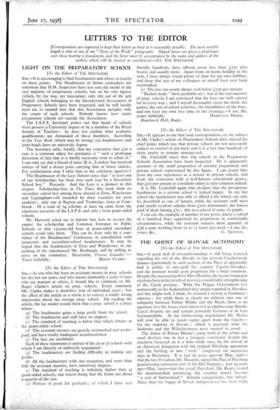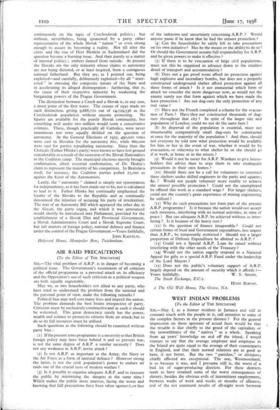THE GHOST OF SLOVAK AUTONOMY
[To the Editor of THE SPECTATOR] SIR,—A good deal of misunderstanding is still being fostered regarding the role of the Slovaks in the present Czechoslovak drama—particularly in such sections of the Press as apparently find it politic to mis-spell the country Czecho-Slovakia ; and the moment would seem propitious for a brief comment. Despite the increased poll for Herr Henlein, the recent municipal elections have in fact resulted in a very considerable strengthening of the Czech position. What the Prague Government lost numerically in the Sudetenland they amply regained in Slovakia, and this might well, I think, be claimed a victory at Germany's expense : for while there is clearly no relation save one of antipathy between Father Hlinka and the Reich, there is no question that the forces most interested in emphasising Slovak- Czech disunity are and remain primarily German or at least Germanophile. At the forthcoming negotiations Dr. Hodza will now be able to speak—quite apart from the Czechs— for the majority of Slovaks ; which is precisely what the Sudetens and the Wilhclmstrasse most wanted to avoid.
The defeat of Father Hlinka's party both in the urban and rural districts was in fact a foregone conclusion despite the attention focussed on it a little while since by the arrival of an American delegation with the original Pittsburg agreement and the holding of two " rival " congresses on successive days in Bratislava. It is just 20 years ago—in May, 1918— that the late President, Dr. Masaryk, signed the Pact of Pittsburg guaranteeing autonomy east of the Bile Karpaty ; just 19 years ago—May, 1919—that the actual President, Dr. Bones, issued his memorandum promising the country would become " a sort of Switzerland." Solemn engagements, but unkept. Since then the bogey of Slovak independence has been fairly
continuously on the tapis of Czechoslovak politics ; but without, nevertheless, being sponsored by a party either representative of the whole Slovak " nation " or even strong enough to assure its becoming a reality. Not till after the crisis and the rise of Herr Henlein in Sudetenland did the question become a burning issue. And then purely as a matter of internal politics ; embers fanned from outside. At present the Slovaks are the only minority whose claims to autonomy are not being dictated, or at least inspired, from a contiguous national fatherland. But they are, as I pointed out, being exploited—and carefully, deliberately exploited—by all " inter- ested " in stressing the composite nature of the State and in accelerating its alleged disintegration : furthering, that is, the cause of their respective minority by weakening the bargaining powers of the Prague Government.
The distinction between a Czech and a Slovak is, in any case, a moot point of the first water. The census of 193o made no such distinction, giving 9,688,770 out of 14,729,536 as the Czechoslovak population without anyone protesting. No figures are available for the purely Slovak community, but something well under two million would seem a conservative estimate. These, though practically all Catholics, were never unanimous nor even equally divided on the question of autonomy. At the General Elections of 1935, 490,000 votes were cast in Slovakia for the autonomy bloc, while 66o,000 were cast for parties repudiating autonomy. Since then the Clericals (Father Hlinka's party) were known to have lost ground considerably as a result of the secession of the Slovak Nationalists to the Coalition camp. The municipal elections merely brought confirmation, albeit essential confirmation, of Dr. Hodza's claim to represent the majority of his compatriots. In Bratislava itself, for instance, the Coalition parties polled 25,000 as against the 8,000 of the Autonomists.
Lastly, the " autonomy " claimed is simply not synonymous for independence, as it has been made out to be, nor is calculated to lead to it. Father Hlinka has continually emphasised the loyalty of the Slovaks to the Republic and as continually denounced the injustice of accusing his party of irredentism. The text of an Autonomy Bill which appeared the other day in the Slovak, the party organ, and which it was announced would shortly be introduced into Parliament, provided for the establishment of a Slovak Diet and Provincial Government, a Slovak Administrative Court and a Slovak Supreme Court, but left matters of foreign policy, national defence and finance under the control of the Prague Government.—Yours faithfully, JOHN KAESTLIN.
Holyrood House, Montpelier Row, Twickenham.



















































 Previous page
Previous page